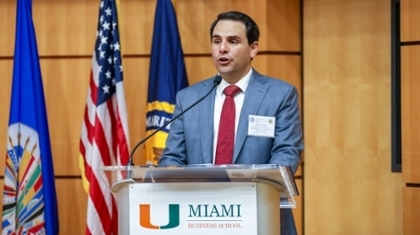“We must work together to build a resilient system that protects our people and our ports from major disasters,” said Ambassador H.E. Carlos Trujillo, permanent representative, Mission of the United States to the Organization of American States (OAS). “As the largest trading partner for the Caribbean, the U.S. understands the importance of the region’s ports in supporting both economic prosperity and domestic security.”
Miami Business School Dean John Quelch welcomed more than 75 representatives from 15 Caribbean basin countries to the three-day conference, September 19-21. “To run effective ports, you need a spirit of partnership with the transportation companies, security, and law enforcement authorities,” said Quelch. Recounting his service as chair of the Massachusetts Port Authority in Boston after the 9/11 terrorist attacks, Quelch said, “We instituted a daily briefing with all our partners to address security issues, and build that spirit of trust.”
In the opening conference session, Lonnie Kishiyama, director, Office of International Activities, Maritime Administration, U.S. Department of Transportation, said, “Ocean commerce continues to drive the world’s economy. It is critical for ports to address their security vulnerabilities while ensuring efficient cargo handling.”
Jorge Duran, secretary, Inter-American Committee on Ports of the OAS, emphasized the importance of the hemispheric conference and thanked the U.S. State Department and CIBER for their support. “We selected disaster risk mitigation and emergency response as the theme following last year’s devastating hurricane season,” he said. “Our goal is to facilitate the transfer of knowledge to ports throughout the region.”
Joseph Ganitsky, professor of management at the Miami Business School and director of CIBER, said that enhancing U.S. competitiveness is the primary mission of the 17 international business education and research centers throughout the U.S. Noting the success of the first hemispheric port security conference at UM in February 2017, Ganitsky said, “At the University of Miami, we understand the paramount importance of an efficient and secure global supply chain. Our faculty members have built strong relationships with port officials and logistics providers, opening the doors for our students considering careers in these fields.”
A former South Florida attorney and state legislator, Trujillo served as a special advisor at the United States Mission to the United Nations prior to his appointment to the OAS position in March. In his talk to port officials, Trujillo emphasized the importance of sharing ideas and best practices for disaster preparedness. “Improving your security infrastructure might involve raising bridge heights, widening roads, strengthening airport security, or taking other steps to improve resilience,” he said.
Cynthia Hudson, the CEO, Hudson Analytix, agreed, noting that the first step in effective disaster risk management is taking a coordinated look at current arrangements. “You can’t just look at one silo,” she added. “Physical risks, cybersecurity, environmental and health risks all impact each other. Once you have identified those areas, you need to engage your stakeholders and the community right from the start.”
To view photos from the event, click here.

